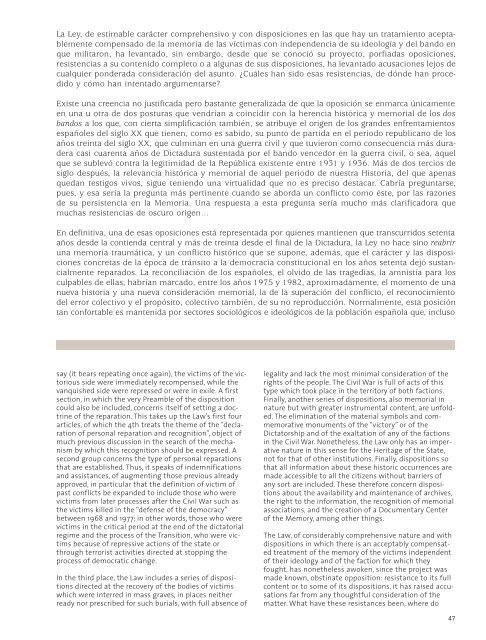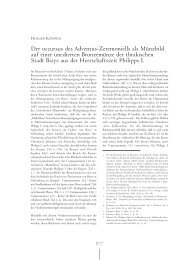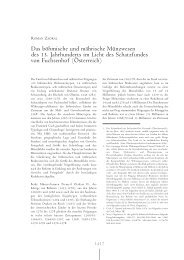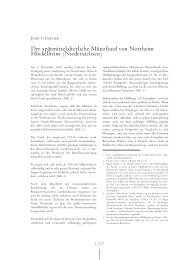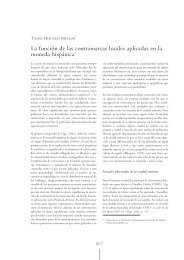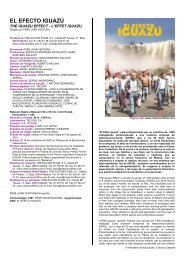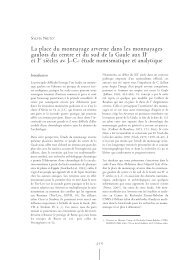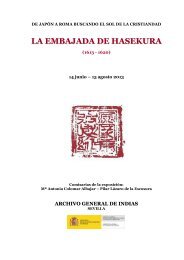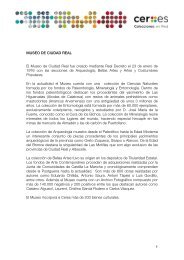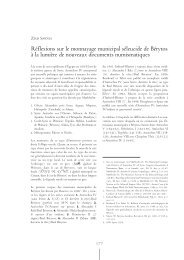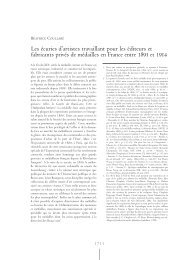La Ley de Memoria Histórica: reparación e insatisfacción Julio ...
La Ley de Memoria Histórica: reparación e insatisfacción Julio ...
La Ley de Memoria Histórica: reparación e insatisfacción Julio ...
You also want an ePaper? Increase the reach of your titles
YUMPU automatically turns print PDFs into web optimized ePapers that Google loves.
<strong>La</strong> <strong>Ley</strong>, <strong>de</strong> estimable carácter comprehensivo y con disposiciones en las que hay un tratamiento aceptablemente<br />
compensado <strong>de</strong> la memoria <strong>de</strong> las víctimas con in<strong>de</strong>pen<strong>de</strong>ncia <strong>de</strong> su i<strong>de</strong>ología y <strong>de</strong>l bando en<br />
que militaron, ha levantado, sin embargo, <strong>de</strong>s<strong>de</strong> que se conoció su proyecto, porfiadas oposiciones,<br />
resistencias a su contenido completo o a algunas <strong>de</strong> sus disposiciones, ha levantado acusaciones lejos <strong>de</strong><br />
cualquier pon<strong>de</strong>rada consi<strong>de</strong>ración <strong>de</strong>l asunto. ¿Cuáles han sido esas resistencias, <strong>de</strong> dón<strong>de</strong> han procedido<br />
y cómo han intentado argumentarse?<br />
Existe una creencia no justificada pero bastante generalizada <strong>de</strong> que la oposición se enmarca únicamente<br />
en una u otra <strong>de</strong> dos posturas que vendrían a coincidir con la herencia histórica y memorial <strong>de</strong> los dos<br />
bandos a los que, con cierta simplificación también, se atribuye el origen <strong>de</strong> los gran<strong>de</strong>s enfrentamientos<br />
españoles <strong>de</strong>l siglo XX que tienen, como es sabido, su punto <strong>de</strong> partida en el periodo republicano <strong>de</strong> los<br />
años treinta <strong>de</strong>l siglo XX, que culminan en una guerra civil y que tuvieron como consecuencia más dura<strong>de</strong>ra<br />
casi cuarenta años <strong>de</strong> Dictadura sustentada por el bando vencedor en la guerra civil, o sea, aquel<br />
que se sublevó contra la legitimidad <strong>de</strong> la República existente entre 1931 y 1936. Más <strong>de</strong> dos tercios <strong>de</strong><br />
siglo <strong>de</strong>spués, la relevancia histórica y memorial <strong>de</strong> aquel periodo <strong>de</strong> nuestra Historia, <strong>de</strong>l que apenas<br />
quedan testigos vivos, sigue teniendo una virtualidad que no es preciso <strong>de</strong>stacar. Cabría preguntarse,<br />
pues, y esa sería la pregunta más pertinente cuando se aborda un conflicto como éste, por las razones<br />
<strong>de</strong> su persistencia en la <strong>Memoria</strong>. Una respuesta a esta pregunta sería mucho más clarificadora que<br />
muchas resistencias <strong>de</strong> oscuro origen…<br />
En <strong>de</strong>finitiva, una <strong>de</strong> esas oposiciones está representada por quienes mantienen que transcurridos setenta<br />
años <strong>de</strong>s<strong>de</strong> la contienda central y más <strong>de</strong> treinta <strong>de</strong>s<strong>de</strong> el final <strong>de</strong> la Dictadura, la <strong>Ley</strong> no hace sino reabrir<br />
una memoria traumática, y un conflicto histórico que se supone, a<strong>de</strong>más, que el carácter y las disposiciones<br />
concretas <strong>de</strong> la época <strong>de</strong> tránsito a la <strong>de</strong>mocracia constitucional en los años setenta <strong>de</strong>jó sustancialmente<br />
reparados. <strong>La</strong> reconciliación <strong>de</strong> los españoles, el olvido <strong>de</strong> las tragedias, la amnistía para los<br />
culpables <strong>de</strong> ellas, habrían marcado, entre los años 1975 y 1982, aproximadamente, el momento <strong>de</strong> una<br />
nueva historia y una nueva consi<strong>de</strong>ración memorial, la <strong>de</strong> la superación <strong>de</strong>l conflicto, el reconocimiento<br />
<strong>de</strong>l error colectivo y el propósito, colectivo también, <strong>de</strong> su no reproducción. Normalmente, esta posición<br />
tan confortable es mantenida por sectores sociológicos e i<strong>de</strong>ológicos <strong>de</strong> la población española que, incluso<br />
say (it bears repeating once again), the victims of the victorious<br />
si<strong>de</strong> were immediately recompensed, while the<br />
vanquished si<strong>de</strong> were repressed or were in exile. A first<br />
section, in which the very Preamble of the disposition<br />
could also be inclu<strong>de</strong>d, concerns itself of setting a doctrine<br />
of the reparation. This takes up the <strong>La</strong>w’s first four<br />
articles, of which the 4th treats the theme of the “<strong>de</strong>claration<br />
of personal reparation and recognition”, object of<br />
much previous discussion in the search of the mechanism<br />
by which this recognition should be expressed. A<br />
second group concerns the type of personal reparations<br />
that are established. Thus, it speaks of in<strong>de</strong>mnifications<br />
and assistances, of augmenting those previous already<br />
approved, in particular that the <strong>de</strong>finition of victim of<br />
past conflicts be expan<strong>de</strong>d to inclu<strong>de</strong> those who were<br />
victims from later processes after the Civil War such as<br />
the victims killed in the “<strong>de</strong>fense of the <strong>de</strong>mocracy”<br />
between 1968 and 1977; in other words, those who were<br />
victims in the critical period at the end of the dictatorial<br />
regime and the process of the Transition, who were victims<br />
because of repressive actions of the state or<br />
through terrorist activities directed at stopping the<br />
process of <strong>de</strong>mocratic change.<br />
In the third place, the <strong>La</strong>w inclu<strong>de</strong>s a series of dispositions<br />
directed at the recovery of the bodies of victims<br />
which were interred in mass graves, in places neither<br />
ready nor prescribed for such burials, with full absence of<br />
legality and lack the most minimal consi<strong>de</strong>ration of the<br />
rights of the people. The Civil War is full of acts of this<br />
type which took place in the territory of both factions.<br />
Finally, another series of dispositions, also memorial in<br />
nature but with greater instrumental content, are unfol<strong>de</strong>d.<br />
The elimination of the material symbols and commemorative<br />
monuments of the “victory” or of the<br />
Dictatorship and of the exaltation of any of the factions<br />
in the Civil War. Nonetheless, the <strong>La</strong>w only has an imperative<br />
nature in this sense for the Heritage of the State,<br />
not for that of other institutions. Finally, dispositions so<br />
that all information about these historic occurrences are<br />
ma<strong>de</strong> accessible to all the citizens without barriers of<br />
any sort are inclu<strong>de</strong>d. These therefore concern dispositions<br />
about the availability and maintenance of archives,<br />
the right to the information, the recognition of memorial<br />
associations, and the creation of a Documentary Center<br />
of the Memory, among other things.<br />
The <strong>La</strong>w, of consi<strong>de</strong>rably comprehensive nature and with<br />
dispositions in which there is an acceptably compensated<br />
treatment of the memory of the victims in<strong>de</strong>pen<strong>de</strong>nt<br />
of their i<strong>de</strong>ology and of the faction for which they<br />
fought, has nonetheless awoken, since the project was<br />
ma<strong>de</strong> known, obstinate opposition: resistance to its full<br />
content or to some of its dispositions, it has raised accusations<br />
far from any thoughtful consi<strong>de</strong>ration of the<br />
matter. What have these resistances been, where do<br />
47


